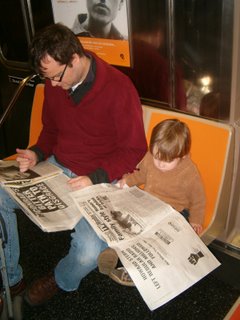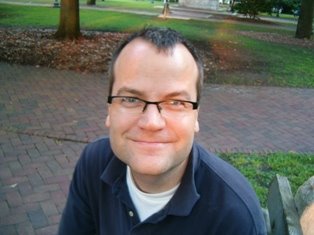 The Girl said her first word this morning at 6:30am. Clear as crystal, and right out of the blue. She stood up at her cot, desparate to get out, and said:
The Girl said her first word this morning at 6:30am. Clear as crystal, and right out of the blue. She stood up at her cot, desparate to get out, and said:"Mummy."
Love, Justin.
"I guess that's the way the whole durned human comedy keeps perpetuatin' it-self, down through the generations, westward the wagons, across the sands a time until-- aw, look at me, I'm ramblin' again. Wel, uh hope you folks enjoyed yourselves."

 This is the Boy and I and we are on the W Train coming from Astoria in Queens back into Manhattan. That’s a New York Post. A painful paper. But The Times is too big and too dense to read on subway. Trash is easier to read and easier to leave behind.
This is the Boy and I and we are on the W Train coming from Astoria in Queens back into Manhattan. That’s a New York Post. A painful paper. But The Times is too big and too dense to read on subway. Trash is easier to read and easier to leave behind. The Boy is more of a New Yorker than I am. He has spent nearly half his life here.
The Boy is more of a New Yorker than I am. He has spent nearly half his life here.Love, Justin.

 Tom (the US-born Australian) and Seapea (the Korean-born Canadian) both mentioned that they had to ‘toast’ or ‘salute’ the Queen when they become citizens of their particular domains of her Majesty. But you may have noticed that Australia does not require this. Laurel certainly didn’t have to toast, salute or pledge anything to the Queen.
Tom (the US-born Australian) and Seapea (the Korean-born Canadian) both mentioned that they had to ‘toast’ or ‘salute’ the Queen when they become citizens of their particular domains of her Majesty. But you may have noticed that Australia does not require this. Laurel certainly didn’t have to toast, salute or pledge anything to the Queen.I, [name], do swear that I will be faithful and bear true allegiance to Her Majesty Queen Elizabeth II, Her Heirs and Successors according to law and that I will faithfully observe the laws of Jamaica and fulfil my duties as a citizen of Jamaica.B. Or New Zealand...
I [name] swear that I will be faithful and bear true allegiance to Her Majesty Queen Elizabeth the Second, Queen of New Zealand, Her heirs and successors according to law, and that I will faithfully observe the laws of New Zealand and fulfil my duties as a New Zealand citizen. So help me God.C. Or Canada.
I swear (or affirm) that I will be faithful and bear true allegiance to Her Majesty Queen Elizabeth II, Queen of Canada, Her Heirs and Successors, and that I will faithfully observe the Laws of Canada and fulfill my duties as a Canadian citizen.The sun appears to be setting...

From this time forward, [under God], I pledge my loyalty to Australia and its people, whose democratic beliefs I share, whose rights and liberties I respect, and whose laws I will uphold and obey.
I hereby declare, on oath, that I absolutely and entirely renounce and abjure all allegiance and fidelity to any foreign prince, potentate, state, or sovereignty of whom or which I have heretofore been a subject or citizen; that I will support and defend the Constitution and laws of the United States of America against all enemies, foreign and domestic; that I will bear true faith and allegiance to the same; that I will bear arms on behalf of the United States when required by law; that I will perform non-combatant service in the armed forces of the United States when required by the law; that I will perform work of national importance under civilian direction when required by the law; and that I take this obligation freely without any mental reservation or purpose of evasion; so help me God.
PS Name the town for points, and the statue for extra points. For even more points, name this town's two most famous preachers…
 US President Moffatt!
US President Moffatt!


You see, at 7:46 this morning, the
299, 999, 998 ... without my contribution.
I am not American. The wife is. But we have begotten two little potential taxpayers for their economy; two soldiers for their armies; two servants of their churches; two citizens of their cities...
For years, I thought that the only thing the Boy and the Girl could never become is the Commander-in-Chief and President of the
But I have just found out that they may in fact eligible. Or at least I think they are.
Article 2 of the
(g) a person born outside the geographical limits of the United States and its outlying possessions of parents one of whom is an alien, and the other a citizen of the United States who, prior to the birth of such person, was physically present in the United States or its outlying possessions for a period or periods totalling not less than five years, at least two of which were after attaining the age of fourteen years.
 I don't know John. I haven't met him. And I probably will never meet him. John and his wife live and study in Atlanta... so we at least have that city in common. (My wife is from the great state of Georgia.)
I don't know John. I haven't met him. And I probably will never meet him. John and his wife live and study in Atlanta... so we at least have that city in common. (My wife is from the great state of Georgia.)And also this:Describing the failure of modern preachers in critically engaging with the drama of the Hebrew Scriptures, Ellen Davis writes:
"Occasionally...a preacher may venture across that gulf [from the New to the Old Testament] and bring something back: a nugget, a small treasure, that is congenial with the gospel message and adds to it sparkle or depth of background."I am convicted by this.
We read these texts as if they were gift shops at the Vatican: browsing for a trinket, but only the one's that fit our luggage.Worth a peak and a comment.
 This is a bit of fun. Please don’t take me seriously.
This is a bit of fun. Please don’t take me seriously.Don't feel intimidated by MPJ’s brilliance -- it’s all smoke and mirrors, really! :) He really does want collaboration and feedback on his work.
Love, Justin.

Reflection #3 on Mark 9:14-29
I have three reflections from Mark 9:
1. Jesus enters our lives as they really are.
2. Jesus powerfully speaks to our terrors and pains.
3. Jesus tenderly addresses our faithful doubts.
3. Jesus tenderly addresses our faithful doubts.
Doubt is in vogue right now. We live in a post modern world. So interestingly, doubt has become easier than ever -- at least the expression of it. We hear of authors now saying that one of their 'strengths' is their 'capacity to doubt'. Buechner himself defends doubts as 'The ants in the pants of faith keeping faith awake and moving.' Christian leaders are now often saying the obvious truth: 'We don’t have all the answers'. Obviously! Doubt is what our society does best. And Christians want to resonate at this point.
Let me say straight up the doubt can be a horrible thing:
Os Guinness wrote:
“And underneath everything lies trust. From friendships of children to agreements among nations life depends on trust. Enjoying people is trust. Trust is the shared silence, the exchanged look, the expressive touch. Crying for help is trust, shaking hands is trust, a kiss is trust. The highest reaches of love and life depend on trust. Are there any questions more important to each of us than, ‘whom can I trust? How can I be sure’?
That is why when trust goes and doubt comes in such a shadow is cast, such a wound is opened, and such a hole is left. ... It is also why doubting God is so devastating.”
James warns against doubt. We ought not to be flippant about doubt. And we ought to know that when we entertain doubts, we are playing with fire.
So why is this Father treated with compassion? Why is his unbelief seemingly rewarded?
The Father has what I call faithful doubt. (Or even real faith in a real world).
Two things about faithful doubt:
A. Faithful doubt is paradoxically the only way that you can come to God.
What does this father do? He comes to Jesus in the first place with obvious helplessness. That’s what faith is. That’s trust. Trust coming to Jesus even in your unbelief. It's helplessness, not holiness that is the perquisite for coming to Jesus. That is good news. Faith is when you doubt yourself -- even your ability to believe. And go to Jesus anyway.
Faith is not - 'I’ve figured it all out'. 'Now I have faith in you Jesus'. 'Can I have my membership badge, now, please'? That’s not faith in God, that’s faith in yourself.
It is essential in becoming a Christian and staying a Christian that your frailty is right there next to your faith. Because then (and only then) do you depend on God.
It’s OK for me to 'light' on faith, if I come to God knowing he is 'heavy' on grace. Then, and only then, are you (paradoxically) really 'heavy' on faith.
Get that?
Its one the paradoxes of faith.
Christina Rossetti wrote a hymn -- rarely sung [we sang it at EU AnnCon at Sydney Uni] called "None other lamb". It goes:
My faith burns low, my hope burns low;
Only my heart's desire cries out in me
By the deep thunder of its want and woe,
Cries out to thee.
Lord, thou art Life, though I be dead;
Love's fire thou art, however cold I be:
Nor heav'n have I, nor place to lay my head,
Nor home, but thee.
'My faith burns low'. 'I may be dead'. 'I may be cold'. 'But my heart's desire cried out in me'. It is one of the few hymns that genuinely reflect this paradox of faithful doubt.
You see that this man has a prayer: (‘Prayer’ is the same word for ‘request’, even in old English --- ‘I pray you, come here’ is I request you come here.) He has a prayer (or a request) for Jesus: V22
“If you are able to do anything, have mercy on us and help us.”
That was all that was required. A prayer!
Why couldn’t the other disciples cast out the demon?
The answer is -- because they didn’t pray. They didn’t ask God. It's as simple as that.
V28 -- “Why couldn’t we cast the demon out?”
V29 -- “Because this kind only come out with prayer.”
The disciples were probably trying to do some sort of incantation thing?! When all they needed to do was pray. All they needed was to say: "God, help us."
In the Matthew account, Jesus said that all the disciples needed was the faith of a mustard seed. They could have done this AND moved a mountain ... all before lunch. Which -- I take it -- is a cheeky way of saying that the fact that they haven’t asked reflects that their faith is smaller than a malnourished piece of rice.
But this man apparently has the faith of a little mustard seed. And that’s all he has. And all he needed.
Because he seems to know intuitively that ‘this kind only comes out through prayer.’ That’s what he prays: “If you are able to do anything, have mercy on us and help us.”
The second thing to say about faithful doubt is this:
B. Faithful doubt always sides with faith.
Faithful doubt doesn’t side with the doubt. It sides with faith. Jesus says to the father's faithful request: V23
“'If you are able'. All things can be done for the one who believes.”And the man says -- and again -- I think that the text is slowed up for us: Immediately -- the man -- he cries out -- the pain of this moment --
“I believe, help me my unbelief.”
I have belief, but I’m riddled with unbelief. But I’ll side with faith.
A good friend of mine says that this verse is a motto, and the man a hero. Because he believes and throws himself on Jesus in the midst of his unbelief... they are there -- belief and unbelief at the same time.' And we understand: Not on paper, but we totally get it in the heart.
He is doing what the Psalmists do -- They go to God in faith and tell him their doubts but instead of siding with the doubt, they side with faith. He is doing what the Prophets did: Men like Habakkuk who went to God to tell him their complaints. But instead of siding with the doubt, they side with faith.
Let me conclude:
'Siding with faith' is the disciples to Jesus: In John 6, when a large group of people left Jesus because his teaching was 'too hard', Jesus said to them:
So Jesus said to the Twelve, "Do you want to go away as well?" Simon Peter
answered him, "Lord, to whom shall we go? You have the words of eternal life."
Tidy.
Here endeth the lesson. Hope you enjoyed...
Love, Justin.
 (Pic: 'A displaced father holds his ill son at a clinic in Tawila, North Darfur'. It is a difficult picture to post. But it may help to provide some gravitas in capturing something of what the father in our story may have felt.)
(Pic: 'A displaced father holds his ill son at a clinic in Tawila, North Darfur'. It is a difficult picture to post. But it may help to provide some gravitas in capturing something of what the father in our story may have felt.)“Come out and never enter him again.”
Jesus is giving a 'Kingdom snapshot' here. Jesus came to deal with terror and evil and suffering. And the unclean spirit leaves the boy with convulsion. But then in V26, the text becomes all deliberate. The text slows up here.
The boy was ‘like a corpse’, so that most of them said: “He is dead.”
We are being given a glimpse, as it were, of death...
It looks bad. But Jesus (V27) then touches the untouchable, the unclean, the dead boy. And in his touch, he ‘lifts him up’ -- the original word is he ‘raised him up’. The implication is that the boy is being raised from the (apparent) dead -- and the boy had ‘the power to stand’.
1. Jesus enters our lives as they really are.
2. Jesus powerfully speaks to our terrors and pains.
3. Jesus tenderly addresses our faithful doubts.
Today, I give you Reflection #1. Questions, comments, helpful critiques are welcome. [Thanks Rhea!]
1. Jesus enters our lives as they really are: Confused and complex and messy.
Look at V 14-16
What’s happening here? Jesus is entering an already existing moment. He is gate-crashing an argument. And the argument has been going on for enough time for Mark to note that a crowd has gathered. V14. ‘A great crowd’, in fact. And like many who wonder into a conversation, he says: V16 -- “What’s the argument about?” I’m up for debate. I’d like to know what’s going on.
In my research this week, I realized something that I’d not seen before: Mark places two events deliberately together: the transfiguration of Jesus and the story of the torment of this father. They are being overlapped. [Luke records that is was the next day, whereas Mark and Matthew more deliberately overlap the events.]
Here is what I think is happening: One extraordinary thing is happening up on a high mountain. And at the same time, one ordinary thing is happening at the foot of the mountain.
And one very ordinary argument is happening down at the foot of the Mountain. Just like
“Let me in on that argument.”
“Let me into your real life.”
“What’s the debate going on in your head?
“What’s the debate going on in your communities?”
“Let me speak to it.”

V.24: “I believe, help my unbelief.”V 24.. Now there is a sentence that appears contradictory. It makes no sense on paper. But make total sense in the heart.
